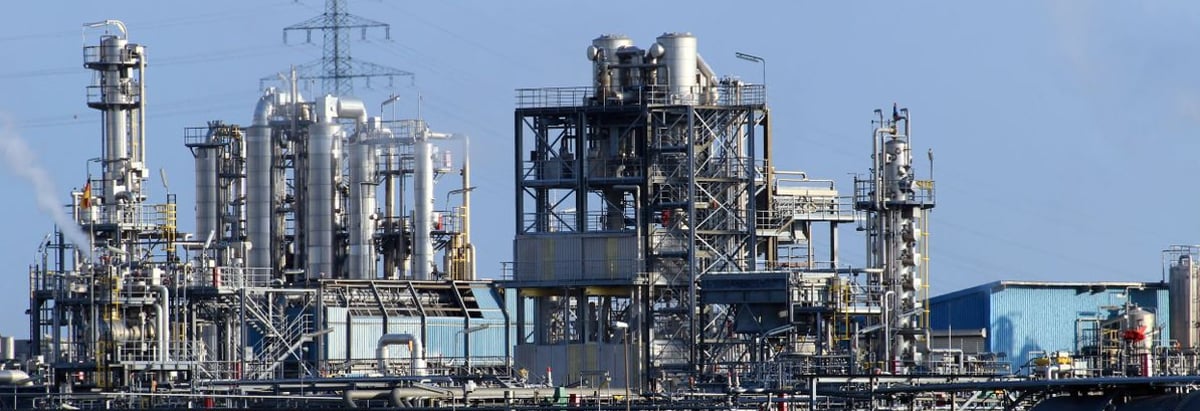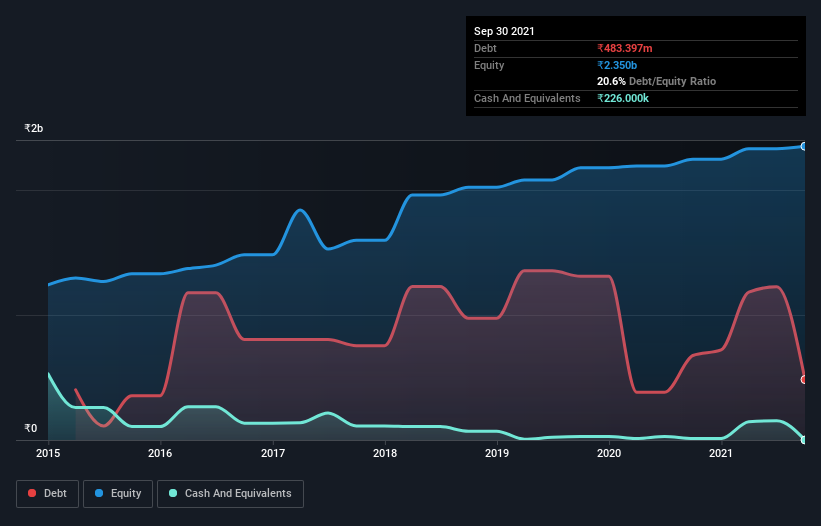
The external fund manager backed by Berkshire Hathaway's Charlie Munger, Li Lu, makes no bones about it when he says 'The biggest investment risk is not the volatility of prices, but whether you will suffer a permanent loss of capital.' So it might be obvious that you need to consider debt, when you think about how risky any given stock is, because too much debt can sink a company. We can see that GP Petroleums Limited (NSE:GULFPETRO) does use debt in its business. But should shareholders be worried about its use of debt?
Why Does Debt Bring Risk?
Debt is a tool to help businesses grow, but if a business is incapable of paying off its lenders, then it exists at their mercy. If things get really bad, the lenders can take control of the business. While that is not too common, we often do see indebted companies permanently diluting shareholders because lenders force them to raise capital at a distressed price. By replacing dilution, though, debt can be an extremely good tool for businesses that need capital to invest in growth at high rates of return. When we think about a company's use of debt, we first look at cash and debt together.
Check out our latest analysis for GP Petroleums
What Is GP Petroleums's Net Debt?
You can click the graphic below for the historical numbers, but it shows that GP Petroleums had ₹483.4m of debt in September 2021, down from ₹676.1m, one year before. And it doesn't have much cash, so its net debt is about the same.

How Healthy Is GP Petroleums' Balance Sheet?
We can see from the most recent balance sheet that GP Petroleums had liabilities of ₹814.1m falling due within a year, and liabilities of ₹70.7m due beyond that. Offsetting this, it had ₹226.0k in cash and ₹1.03b in receivables that were due within 12 months. So it actually has ₹145.5m more liquid assets than total liabilities.
This surplus suggests that GP Petroleums has a conservative balance sheet, and could probably eliminate its debt without much difficulty.
In order to size up a company's debt relative to its earnings, we calculate its net debt divided by its earnings before interest, tax, depreciation, and amortization (EBITDA) and its earnings before interest and tax (EBIT) divided by its interest expense (its interest cover). This way, we consider both the absolute quantum of the debt, as well as the interest rates paid on it.
GP Petroleums's net debt of 2.3 times EBITDA suggests graceful use of debt. And the fact that its trailing twelve months of EBIT was 9.3 times its interest expenses harmonizes with that theme. Sadly, GP Petroleums's EBIT actually dropped 6.0% in the last year. If earnings continue on that decline then managing that debt will be difficult like delivering hot soup on a unicycle. When analysing debt levels, the balance sheet is the obvious place to start. But it is GP Petroleums's earnings that will influence how the balance sheet holds up in the future. So if you're keen to discover more about its earnings, it might be worth checking out this graph of its long term earnings trend.
Finally, while the tax-man may adore accounting profits, lenders only accept cold hard cash. So we always check how much of that EBIT is translated into free cash flow. Happily for any shareholders, GP Petroleums actually produced more free cash flow than EBIT over the last three years. That sort of strong cash generation warms our hearts like a puppy in a bumblebee suit.
Our View
Happily, GP Petroleums's impressive conversion of EBIT to free cash flow implies it has the upper hand on its debt. But truth be told we feel its EBIT growth rate does undermine this impression a bit. When we consider the range of factors above, it looks like GP Petroleums is pretty sensible with its use of debt. While that brings some risk, it can also enhance returns for shareholders. There's no doubt that we learn most about debt from the balance sheet. But ultimately, every company can contain risks that exist outside of the balance sheet. We've identified 4 warning signs with GP Petroleums (at least 1 which is a bit concerning) , and understanding them should be part of your investment process.
At the end of the day, it's often better to focus on companies that are free from net debt. You can access our special list of such companies (all with a track record of profit growth). It's free.
If you're looking to trade GP Petroleums, open an account with the lowest-cost platform trusted by professionals, Interactive Brokers.
With clients in over 200 countries and territories, and access to 160 markets, IBKR lets you trade stocks, options, futures, forex, bonds and funds from a single integrated account.
Enjoy no hidden fees, no account minimums, and FX conversion rates as low as 0.03%, far better than what most brokers offer.
Sponsored ContentNew: Manage All Your Stock Portfolios in One Place
We've created the ultimate portfolio companion for stock investors, and it's free.
• Connect an unlimited number of Portfolios and see your total in one currency
• Be alerted to new Warning Signs or Risks via email or mobile
• Track the Fair Value of your stocks
This article by Simply Wall St is general in nature. We provide commentary based on historical data and analyst forecasts only using an unbiased methodology and our articles are not intended to be financial advice. It does not constitute a recommendation to buy or sell any stock, and does not take account of your objectives, or your financial situation. We aim to bring you long-term focused analysis driven by fundamental data. Note that our analysis may not factor in the latest price-sensitive company announcements or qualitative material. Simply Wall St has no position in any stocks mentioned.
Have feedback on this article? Concerned about the content? Get in touch with us directly. Alternatively, email editorial-team (at) simplywallst.com.
About NSEI:GULFPETRO
GP Petroleums
GP Petroleums Limited formulates, manufactures, and markets industrial and automotive lubricants, rubber process oils, transformer oils, greases, and other specialties to industrial, automotive, and rubber industries in India.
Flawless balance sheet and good value.
Similar Companies
Market Insights
Community Narratives




